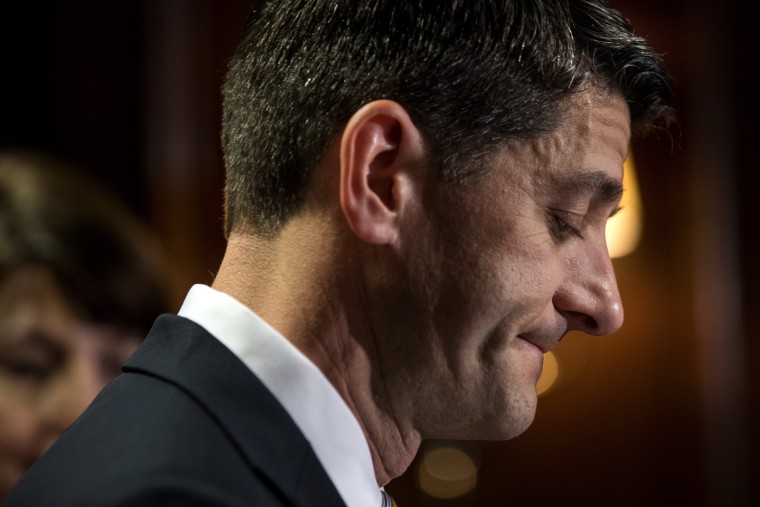House Speaker Paul Ryan (R-Wis.) looks young for a powerful political leader -- he's only 48 -- but he's been around for a surprisingly long time. The Wisconsin Republican took office in the late 1990s while he was still in his 20s. He worked on Capitol Hill as a GOP staffer for several years before that.
And over the course of those nearly three decades, Ryan learned a thing or two about how not to answer a question. Which is a shame because on "Meet the Press," NBC News' Chuck Todd asked him a good one that I would've loved to see the GOP leader address head-on.
In an interview that aired yesterday, the host noted that the Republican tax plan, which Ryan helped write and champion, has spiked the deficit that the House Speaker claimed he wanted to lower. Noting Ryan's looming retirement, Chuck Todd noted that he's walking away from Capitol Hill "with trillion-dollar deficits as far as the eye can see." Ryan had a non-answer at the ready:
"That was going to happen. The baby boomers' retiring was going to do that. These deficit trillion-dollar projections have been out there for a long, long time. Why? Because of mandatory spending which we call entitlements...."
The Speaker's answer went on (and on, and on) from there, with Ryan making the case that the real fiscal challenge for the United States is "mandatory spending" on social-insurance programs like Social Security and Medicare. He added that he's still determined to "fix" them.
At this point, we could explore the dangers of Ryan's proposed "fixes" to social-insurance programs in more detail, but there's no reason to play this game by the Speaker's rules. Let's instead consider the nature of the exchange face value: Ryan said one of his principal goals as a federal policymaker was to not only shrink the government, but also to shrink the deficit. The Republican congressman laid out a blueprint, embraced by his party, to balance the U.S. budget.
But as his career comes to an end, Ryan is confronted with failure. The deficits he vowed to shrink are growing. The debt he said he'd control is exploding. Asked for a defense, Ryan argued on "Meet the Press" that the mess he's leaving to others to clean up was inevitable.
Except, it wasn't. We weren't supposed to have trillion-dollar deficits by 2020 until Ryan passed his tax breaks for the wealthy and big corporations. It's these tax breaks, not "entitlements," that created the fiscal problem Ryan promised to avoid.
Imagine a doctor who identifies a patient he says is ailing and vows to get the patient's health back on track. The physician then gets to work, at which point the patient suddenly gets much worse.
It's at that point that the doctor claps his hands and announces his retirement. When someone points out the patient's dire condition, he responds, "That was going to happen."
Trillion-dollar deficits weren't some natural, unavoidable inevitability. They happened because Ryan took the lead in undermining the nation's finances with a misguided scheme. Asked for an explanation, he apparently doesn't have one.
